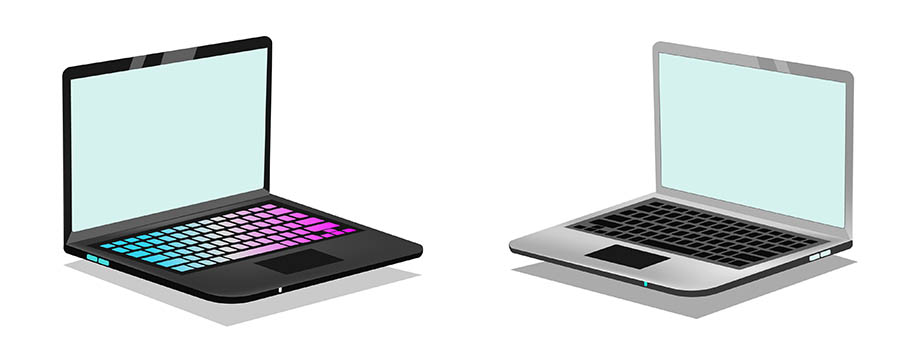If you’re in the market for a cheap laptop, then you’ve probably come across a wide array of options that can be confusing. One of these will typically be a notebook, which is generally mixed in with all the other laptops, with not much of a definition given regarding the difference.
And for the average person, they probably have no idea what a notebook even is, and how it differs from a laptop. Notebook computers are thought to be quite different to laptops.
Fortunately, there isn’t actually much difference between the two and it’s quite easy to explain. So, let’s take a look at how you can differentiate a laptop from a notebook without any issues.
What’s the difference between a laptop and a notebook?
To put it simply, a notebook is always a laptop, but a laptop isn’t always a notebook. Notebooks typically refer to laptops that weigh less than 3 or 4lbs, and are only 2 to 3 inches thick. They also have a smaller display size, with many notebook computers being only 10 or 11 inches in diagonal width.
However, nothing is set in stone when it comes to a notebook. The truth is that there are no hard definitions for what a laptop is, and what a notebook is. Any company can advertise their new laptop as a notebook if they wish to do so.
The main reason why someone would opt for a notebook over a laptop is simply just for convenience. Not everyone needs a large screen or a big keypad to get work done, especially if you aren’t using your device for work purposes.
They tend to be small enough to fit easily into your backpack or bag, and they typically weigh very little too. But what are is the difference between a laptop and a notebook in more specific detail? Well, here are some of the criteria that most notebooks meet.
How to tell a Notebook from a Laptop

The main way you can tell the difference between laptops and notebooks are;
Size

The majority of laptops can range anywhere from 10 inches up to 17 inches – they can be smaller and larger than this, but these are the most common screen sizes.
A notebook will typically be 12 inches or smaller, with the regular laptop screen size being 13 inches or more. Though this isn’t a strict definition, if you see something advertised as a notebook style, it’s likely to be pretty small and portable.
Weight
As mentioned, size is another factor to consider when differentiating a notebook from a laptop. Most laptops classified as notebooks weigh anywhere between 3 and 5 lbs.
RAM & processing power
Typically, a notebook will have 4GB of RAM or memory. This has been 2GB or less in the past, but nowadays, all new releases will come with 4GB of RAM, which is the amount of power most people need. I’d advise you stick to 4GB of more if you can.
Laptops nowadays can also come with 4GB of RAM, but typically premium laptops will start at 8GB of RAM for the base model. And in the near future, we’ll likely being going up to 16GB RAM as the new average within the next few years.
As well as the RAM in your notebook, you’ll probably have significantly less processing power as well. This lack of processing power means that it can be difficult to use a lot of programs simultaneously with a notebook.
Cooling System
Many larger laptops and computers have a large cooling system, which is necessary to keep the internal parts of the laptop from overheating. When your processor starts to work too much, an internal cooling fan is needed for both laptops and desktop computers.
This isn’t necessary for notebooks, or actually even possible due to their size. Most notebooks are fairly low powered, so we don’t really need to worry about a full extensive cooling system.
Manufacturers
Not every brand out there creates notebooks. Some of them may create what is defined as a notebook by someone else, by actually end up calling it something different.
An example of this is a Netbook, which is an even smaller version of a notebook. But, not everyone uses the term netbook either – ASUS have their own Winbook, which just indicates that the laptop uses the Windows operating system.
Low cost
Notebooks tend to be cost effective, so they can be a good idea if you’re looking for a really cheap laptop. This doesn’t mean to say that you can’t find lower cost laptops too, but notebooks are typically budget buys.
They do generally use cheaper and smaller parts in comparison to more expensive laptop computers.
Should I buy a notebook?
If you’re considering purchasing a notebook, then this can be a great idea for some people. However, it really depends on what you’re going to use it for.
Typically notebooks have small screens, so they aren’t good for students or people who work on their laptop. Sure, they’re portable, which is the main difference between a laptop and notebook.
But the small screens aren’t ideal for working long hours, and the configuration and size of the keyboard can also be an issue when you’re typing too. Notebook computers typically aren’t made for business people who end up needing to use their laptop a lot.
Notebooks are a great idea if you’re looking for something cheap for a child to use. It will give them all the functionality of a laptop without the size and cost.
A notebook also might be suitable if you’re looking for something that you’ll only use to browse the internet casually, as they typically aren’t that powerful.
Laptop vs Notebook – Why a laptop is better

For the majority of people, a laptop is going to be the better choice than a notebook computer. There are a few different reasons for this.
The main reason to opt for a laptop is that the screen size is going to be better. This will be more suited to work, whereas a notebook is typically for just simple tasks and web browsing. If you have to stare at a screen all day, then it’s a good idea to make that screen pretty large.
Another pretty good reason for opting for a full laptop instead of a cheaper notebook computer is that a laptop is generally going to have a much better battery life. This means you’ll need to charge it less, and it’ll last longer when it’s charged too.
Also, a key area is the processing power and memory of your laptop, which makes it much better for running larger programs. Laptops also generally have better connectivity in terms of wifi and other connections too.
For most, they’ll be the better choice of the two. There are some circumstances, where it makes sense to opt for a notebook, like if portability is the most important thing for you. But, although the size and weight will be better for carrying with you, you will compromise in some other areas.
Conclusion
All in all, this makes it pretty easy to see how a notebook is really just a small type of laptop. In recent years, Notebooks have actually become less popular, with many people opting to go for a tablet instead, or even a 2-in-1 laptop. A 2-in-1 laptop combines the best of both worlds, giving you the flexibility of a tablet with the power of a laptop.
If we’re looking into the future, then soon we’ll have notebooks that have the same power as a regular sized laptop and more. So if you don’t think a notebook will be powerful enough for you, it will be in the future!